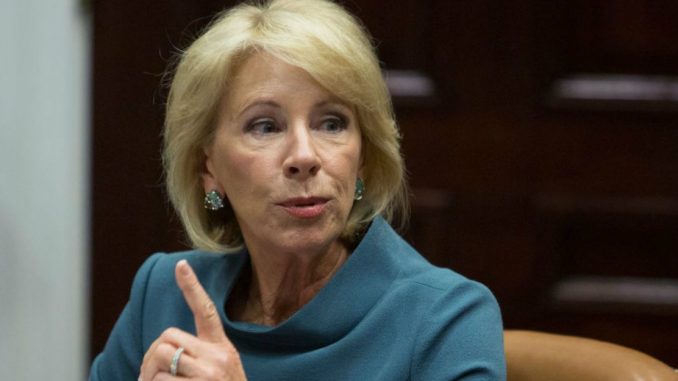
The courts have had it up to here with Betsy DeVos and her agency’s repeat—and apparently ongoing—violation of court orders that require her to stop milking scammed college students for student loan repayments.
Source: Federal Judge Invites Scammed Students to Propose Additional Punishments for Betsy DeVos
In a terse and harsh two-page filing on Tuesday, U.S. Magistrate Judge Sallie Kim called out DeVos for her unlawful efforts to extract those payments from the student victims—who are plaintiffs in a class action lawsuit against the DOE over those illegal actions taken to force and coerce federal remuneration.
Judge Kim noted:
The compliance reports filed by [DeVos and the DOE] have introduced new material facts that are directly relevant to the amount of sanctions appropriate to compensate for [DeVos and the DOE’s] flagrant and continuing violation of the preliminary injunction.
That injunction was issued in May 2018 and barred DeVos from collecting student loan debt payments from a huge class of borrowers who were scammed by for-profit scammers Corinthian Colleges. DeVos and the DOE were initially dinged by the court–and DeVos herself was held in contempt–after admittedly violating that court order by forcing some 16,000 former students to pay back their loans.
Law&Crime previously reported on that violation in September 2019–noting that DOE lawyers confessed to sending collections materials to several thousand student borrowers who paid for educational programs that DeVos herself had previously described as “worthless.” Thousands of student borrowers targeted by the DOE were unable to pay the improperly sent bills–and subsequently had their credit scores tanked, tax rebates trimmed and paychecks garnished due to the improper reporting.
The DOE was forced to issue refunds over the alleged snafu.
The initial compliance report noted:
[T]he [DOE] has determined to issue refunds to all class members who made payments on their loans during a period of time when the Court’s preliminary injunction placed them into forbearance. The [DOE] will also be sending such borrowers notices informing them that they will be receiving refunds, also on a rolling basis, as the borrowers are identified.
The court at first offered patience to the education secretary and her agency’s serially-bumbled response. The judicial tide, however, turned decidedly against DeVos and her underlings after a December 2019 filing revealed that the DOE had actually understated its violations by more than double the actual number.
As Law&Crime reported late last year, the DOE admittedly made several errors when contacting students enrolled in the “worthless” educational programs.
“[A]n updated total of 45,801 borrowers were erroneously taken out of forbearance or stopped collections status, which includes approximately 29,000 borrowers identified since the November Report, and the original 16,034 identified in the November Report that still remain in the class,” the December compliance report said.
Weeks later, attorneys for the student plaintiffs filed a motion seeking to exact a much harsher penalty against DeVos and the DOE, citing their “contumacious conduct” and their “ongoing noncompliance is unfortunate, disturbing, and harmful.”
The students’ motion went on:
[T]he Court’s Sanctions Order was entered on the basis of the record before it at the time, which was grossly inaccurate. The record at the time showed, based on Defendants’ representations in the Initial Compliance Report, that they had violated the injunction 16,000 times by seeking to collect the loans of individuals covered by the injunction. In fact, this representation was off by almost 300 percent. Likewise, the number of people suffering compensable harm in the form of deprivation of money (through “voluntary” payments in response to an unlawful demand for collection, or because Defendants seized their tax refunds and/or wages) or adverse credit reporting was grossly understated.
On Tuesday, Judge Kim took measures to help the students make their case.
“On October 24, 2019, this court issued an order sanctioning [DeVos and the DOE] in the amount of $100,000 for noncompliance with the preliminary injunction entered in this case,” the court’s order notes. “The court simultaneously ordered [DeVos and the DOE] to file monthly compliance reports and tasked the parties with developing a plan for distribution of the sanctions fund to the [student plaintiff] class members injured by [DeVos and the DOE’s] conduct. Plaintiffs now seek leave to file a motion for partial reconsideration of the court’s sanctions order. They argue that, because [the] compliance reports have demonstrated noncompliance with the preliminary injunction far in excess of that originally estimated, the court should revisit the amount of sanctions imposed on [DeVos and the DOE].”
“Accordingly, the court hereby grants [the student plaintiffs] motion for leave to file a motion for partial reconsideration,” Kim’s order concludes.
Those defrauded students will now be allowed to argue why the original $100,000 contempt fine against DeVos should be increased. Expect some fireworks and woe in those eventual arguments.